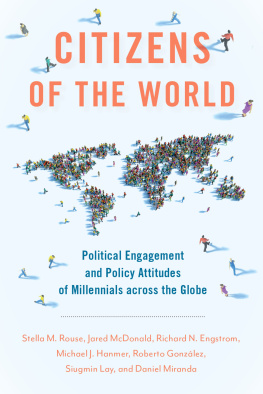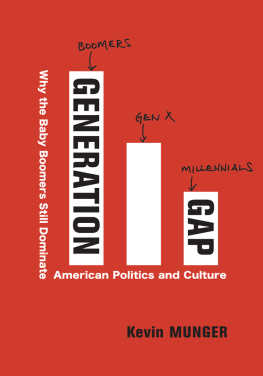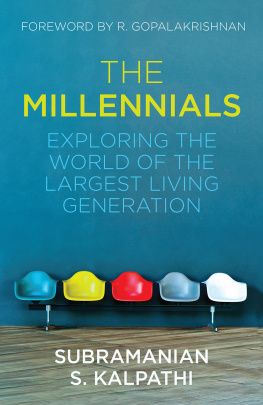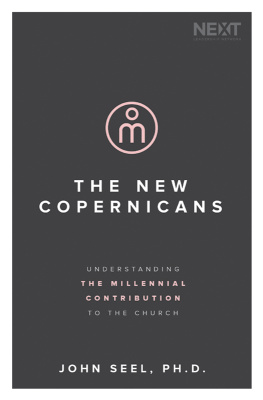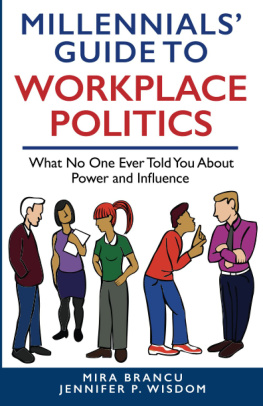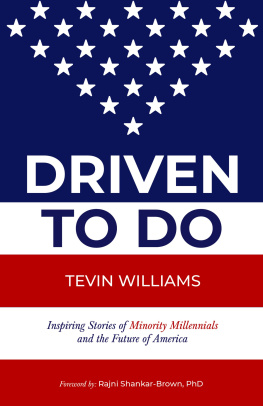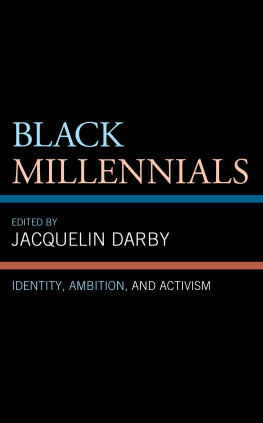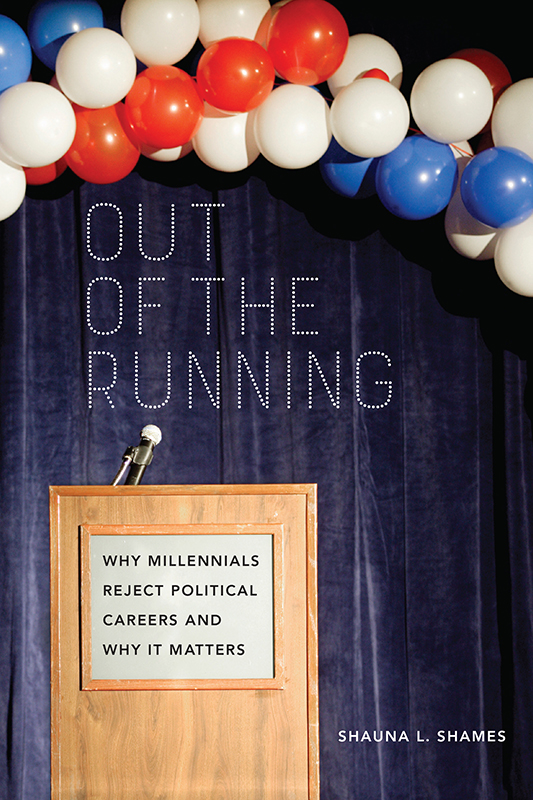Contents
Guide
Pagebreaks of the print version
OUT OF THE RUNNING
Out of the Running
Why Millennials Reject Political Careers and Why It Matters
Shauna L. Shames

NEW YORK UNIVERSITY PRESS
New York
NEW YORK UNIVERSITY PRESS
New York
www.nyupress.org
2017 by New York University
All rights reserved
References to Internet websites (URLs) were accurate at the time of writing. Neither the author nor New York University Press is responsible for URLs that may have expired or changed since the manuscript was prepared.
ISBN: 978-1-4798-2599-8 (hardback)
ISBN: 978-1-4798-7748-5 (paperback)
For Library of Congress Cataloging-in-Publication data, please contact the Library of Congress.
New York University Press books are printed on acid-free paper, and their binding materials are chosen for strength and durability. We strive to use environmentally responsible suppliers and materials to the greatest extent possible in publishing our books.
Manufactured in the United States of America
10 9 8 7 6 5 4 3 2 1
Also available as an ebook
To all the women who run anyway
And to Jo
CONTENTS
LIST OF TABLES AND FIGURES
TABLES
FIGURES
ACKNOWLEDGMENTS
Sincere thanks are due to the following funders, without whose support this research would not have been possible: the Center for American Political Studies at Harvard University (CAPS), the Ash Center for Democratic Governance at Harvards Kennedy School of Government, the Institute for Quantitative Social Science at Harvard University (IQSS), the Taubman Center for State and Local Governance at Harvards Kennedy School of Government, Marie C. Wilson and the White House Project, and Betty and Sidney Shames.
Thanks to the following institutions for permission to conduct research on their campuses: Harvard Law School, Harvards Kennedy School of Government, and Suffolk University Law School, especially Dean Laura Ferrari.
I am indebted to the following (listed alphabetically) for their help developing the thinking and writing in this project: Marni Allen, Melanie Whitley Bowers, Hannah Riley Bowles, Kennaria Brown, Nick Carnes, Emily Clough, Caelyn Cobb, Porsha Cropper, Kelly Dittmar, Johanna Ettin, Susan Faludi, Nadia Farjood, Kristin Goss, Peter Hall, Jennifer Howk, Tracey Hyams, Sandy Maisel, Susan Marine, Matthew Platt, Beth Rabinowitz, Diane Rosenfeld, Kira Sanbonmatsu, Juliet Schor, Rachel Silbermann, Sue Thomas, Danielle Thomsen, Cameron Whitley, Vanessa Williamson, Taylor Woods-Gauthier, Miya Woolfalk, and several anonymous reviewers. Thanks also to discussant and audience comments from groups at the American Political Science Associations annual meetings in August 2013 and September 2015 and at the New England Political Science Associations annual meetings in April 2012 and May 2013, the participants of the Ash Center for Democratic Governance 201213 Fellows Workshop, the participants of the Gender and Sexuality Graduate Workshop, and the participants of the American Politics Research Workshop at Harvard University. Thanks as well to Ruth Mandel for her terrific book In the Running , which inspired both my early interest in women as candidates and the somewhat-depressing title of this book.
Special thanks to my research assistants, interview transcribers, transcription-verifiers, and data monkeys: Nadia Farjood, Johanna Ettin, Gabriel Shames, Jabari Morgan, Avery Hanger, Annalisa Klein, Kara Lessin, Chakera Hightower, Daniel Wallsten, Marion Johnson, Caroline Goldfarb, Oliver Kendall, and Kat Collins and to the research assistants of Nicholas Carnes at Duke University, who also transcribed interviews for this project.
My deepest appreciation is due to my graduate school mentors, Jennifer Hochschild, Claudine Gay, Eileen McDonagh, Jane Mansbridge, and Kay Lehman Schlozman, for their invaluable advice, assistance, and encouragement throughout this process.
Finally, and above all, thank you to all the wonderful survey respondents and interviewees who contributed their time and opinions to this project. Without you, this work could not exist.
Good Reasons Not to Run
In a small conference room at Harvard Law School in 2013, Jared, a twentysomething black male student, leaned over the table to emphasize to me how much he loved politics. But at the same time, he said, the tenor (his word) of the electoral arena bothers him:
I think if you go back to the 60s and the 70s and further back, there were parties, so there was partisan politics, but at the end of the day, people viewed it as a joint venture. Youll hear anecdotes about people debating on the floor, but after, theyd go out to dinner and smoke some cigars and slap each other on the back. They were competitors, but there wasnt the ruthlessness that I see now, and thats very unsettling. And that just contributes to the general malaise that we find ourselves in where we cant seem to get anything accomplished, because everything comes down generally to scoring points. We could do this to get some people jobs, we could extend unemployment benefits, we could give this money to schools, but I dont want to do it because its going to make the other party look good, so Id just rather not do anything. Its like, why do we have this political system? Why did we elect you to represent us if nothing is going to get done?
Later in the interview, he returned to the same theme:
[A] lack of willingness to compromise just makes the whole prospect of going into politics seem potentially unfulfilling, because Im a very results-oriented person, and Id just rather not bother with a headache. I love [politics], but I dont like it enough to deal with the headache of competing for the sake of scoring points. I want to get stuff done, and if I cant get stuff done, Id rather just not bother. Youre looking to legislate or represent people on issues that are going to affect their day-to-day lives, and I just feel it would be tremendously frustrating gridlock.
This well-reasoned frustration is fully rationalbut it is also rather poignant for a political scientist like me to hear. After all, representative democracy depends on having good people willing to run for office. Here, in Jared, we have a smart, caring, and charismatic individual who could be a great political leader but who thinks it is not worth the headache (which word he said not once but twice).
Why not? The costs, he thinks, may outweigh the benefits. That is the essence of rational thinking, after all. Jared did not explicitly provide a list, but from what he has said, we can infer. The costs he sees are primarily two: (1) partisan acrimony/lack of bonhomie (including the negative feelings of malaise and ruthlessness, springing, in his mind, from the overly competitive partisan point-scoring environment); and (2) inability to get things done (frustration/gridlock). These two costs are likely related (perhaps 1 leads to 2, or vice versa), but they are theoretically distinct. In other parts of the interview, Jared (and many other such interviewees) spoke of other costs, such as the feeling that ones privacy would be infringed by constant media attention or the need to raise large sums of money as a candidate.
Jared might be willing to put up with such costs as long as he felt that his work was useful, that he was getting satisfactory results. He says explicitly what he would like to come out of politics: helping people (job creation and promotion, unemployment benefits, better schools). The problem seems to be that he rationally sees some fairly high costs but not enough benefits to balance the scales. Instead, on the reward side, he sees potential unfulfill[ment]. The real problem here for Jareds political ambition was not that he saw politics as costly but that he perceived it as lacking in rewards.


